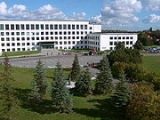
Lithuanian University of Agriculture
Encyclopedia
Lithuanian University of Agriculture is a university in Lithuania
, located in Akademija 7 km (4.3 mi) west of Kaunas
.
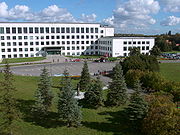
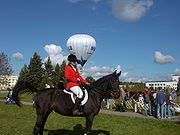
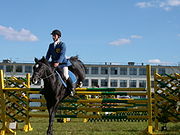
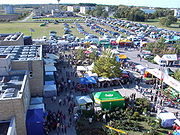
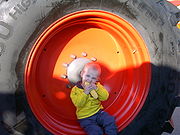
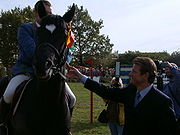
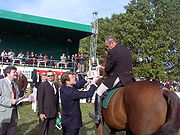
– Forestry
Department at the University of Lithuania (in Kaunas
) and Dotnuva Agricultural College,
the Agricultural Academy was established on September 3, 1924 in Dotnuva
.
The Council of Professors and the first rector of the academy, professor P. Matulionis, were elected. Despite the fact that the economic situation in Lithuania
was complicated and the Government could hardly support the newly established higher school, the Academy developed and grew stronger. In the period of 1924–1937, 125 graduates passed the final examinations and defended diploma theses. However, World War II disrupted usual work. Many of the professors and lecturers from the academy were deported to Siberia
and others were able to escape deportation by withdrawing to Western countries.
In 1945 the Academy
was transferred to Kaunas
. In the beginning of 1946 Faculty of Agricultural Mechanization and Faculty of Water and Land Exploitation were established. As the number of students increased and Extramural department was established, it was decided to build a new campus of Lithuanian Academy of Agriculture in the outskirts of Kaunas
. In 1964 the Academy was moved to the new campus in Noreikiškės, suburb of Kaunas.
The faculties of Water and Land Management and Economics
with lecture-rooms, training laboratories were settled in the campus in 1979. The building of Forest Management Department received the first students in 1982. As a component of Academy campus 9 dormitories for students and residential area where at present most of the staff university live were built. The training premises were equipped and Experimental station was established.
After the independence of Lithuania
was reestablished in 1990, the new system of studies was implemented. New qualification degrees (e.g., Bachelor
, Certified specialist, Master), together with new concepts such as modules and credits, were introduced. Fundamental theoretical subjects became the basis of studies and learning. Applied studies were organized under the resolution of the Councils of Faculties. In this way Lithuanian Academy of Agriculture became a university. Under the resolution of Parliament on October 8, 1996, Lithuanian Academy of Agriculture was granted the name of Lithuanian University of Agriculture.
, Agronomy
, Economics
and Management
, Forestry
, Water and Land Management; 3 institutes – Institute of Rural Culture, Institute of Environment
and Institute of Informatics Technologies; 35 departments; Park of Agricultural Science and Technologies; Innovation
centre; Experimental station; Training farm
.
At present University has 6032 students, of which:
· 3115 are full-time students,
· 2371 – part-time students,
· 471 – Master students,
· 75 – doctoral students.
Pedagogical personnel of the University – 525 people: 33 professors and doctor habilitatus, 179 associated professors, 126 lectors and assistants, 178 – supplementary teaching staff.
The University occupies the area of 862 ha. There are 5 training buildings, experimental station, training centre, training premises with total of 40 lecture rooms, 42 training studies, 80 laboratories, library with funds of 600,000 books (volumes).
Rector Prof. dr. habil. Romualdas Deltuvas
Vice-Rector for Studies Asoc. prof. dr. Jonas Čaplikas
Vice-Rector for Research Prof. dr.habil. Albinas Kusta
Chairman of University Senate Prof. dr.habil. Algirdas Sirvydas
Department of Studies:
Head of Department assoc. prof. Steponas Raudonius
Department of Research:
Head of Department dr. Egidijus Šarauskis
International Department:
Head of Department Minvydas Liegus
and applied studies) and Master degree (postgraduate) studies. After the main studies graduates receive Bachelor degree or qualification degree of profession (engineer
, agronomist
, etc.) in the corresponding field. The main studies take 4 years, part-time studies – 5 years. Having finished the main studies the graduate may choose one of two possibilities – specialist professional studies or studies for Master degree. The duration of specialist studies – 1 year, of studies for Master degree – 2 years. After specialist studies the diploma of certified specialist is conferred, after Master's studies – diploma of Master degree.
The basic study volume unit is study module containing independent study object. Module include various forms of studies: lectures, laboratory work, training, seminars, student’s individual work, projects etc.
The main unit of modul volume is credit. One credit point is equivalent to one study week which refers to 40 hours. This corresponds to 1.5 ECTS credit point. The duration and extent of undergraduate studies are expressed in credit points. A student admitted on to a degree programme is eligible to receive Diploma upon successful completion of total 160 credits and taking final examination or after successful defence of diploma thesis.
Academic year at Lithuanian University of Agriculture is divided into two semesters, 20 weeks each:
Autumn semester begins on September 1;
Spring semester, begins on the first week of February.
partner institutions from EU are invited to come for studies in frame of SOCRATES exchange to the Lithuanian University of Agriculture.
Lithuania
Lithuania , officially the Republic of Lithuania is a country in Northern Europe, the biggest of the three Baltic states. It is situated along the southeastern shore of the Baltic Sea, whereby to the west lie Sweden and Denmark...
, located in Akademija 7 km (4.3 mi) west of Kaunas
Kaunas
Kaunas is the second-largest city in Lithuania and has historically been a leading centre of Lithuanian economic, academic, and cultural life. Kaunas was the biggest city and the center of a powiat in Trakai Voivodeship of the Grand Duchy of Lithuania since 1413. During Russian Empire occupation...
.







History
After restructurisation of the AgronomyAgronomy
Agronomy is the science and technology of producing and using plants for food, fuel, feed, fiber, and reclamation. Agronomy encompasses work in the areas of plant genetics, plant physiology, meteorology, and soil science. Agronomy is the application of a combination of sciences like biology,...
– Forestry
Forestry
Forestry is the interdisciplinary profession embracing the science, art, and craft of creating, managing, using, and conserving forests and associated resources in a sustainable manner to meet desired goals, needs, and values for human benefit. Forestry is practiced in plantations and natural stands...
Department at the University of Lithuania (in Kaunas
Kaunas
Kaunas is the second-largest city in Lithuania and has historically been a leading centre of Lithuanian economic, academic, and cultural life. Kaunas was the biggest city and the center of a powiat in Trakai Voivodeship of the Grand Duchy of Lithuania since 1413. During Russian Empire occupation...
) and Dotnuva Agricultural College,
the Agricultural Academy was established on September 3, 1924 in Dotnuva
Dotnuva
Dotnuva is a small town with a 2003 population of 775 in central Lithuania, 10 km northwest of Kėdainiai, in the Kėdainiai district municipality. It is located on the Dotnuvėlė River. The geographical center of Lithuania, in the village of Ruoščiai, is only a few kilometers away from the...
.
The Council of Professors and the first rector of the academy, professor P. Matulionis, were elected. Despite the fact that the economic situation in Lithuania
Lithuania
Lithuania , officially the Republic of Lithuania is a country in Northern Europe, the biggest of the three Baltic states. It is situated along the southeastern shore of the Baltic Sea, whereby to the west lie Sweden and Denmark...
was complicated and the Government could hardly support the newly established higher school, the Academy developed and grew stronger. In the period of 1924–1937, 125 graduates passed the final examinations and defended diploma theses. However, World War II disrupted usual work. Many of the professors and lecturers from the academy were deported to Siberia
Siberia
Siberia is an extensive region constituting almost all of Northern Asia. Comprising the central and eastern portion of the Russian Federation, it was part of the Soviet Union from its beginning, as its predecessor states, the Tsardom of Russia and the Russian Empire, conquered it during the 16th...
and others were able to escape deportation by withdrawing to Western countries.
In 1945 the Academy
Academy
An academy is an institution of higher learning, research, or honorary membership.The name traces back to Plato's school of philosophy, founded approximately 385 BC at Akademia, a sanctuary of Athena, the goddess of wisdom and skill, north of Athens, Greece. In the western world academia is the...
was transferred to Kaunas
Kaunas
Kaunas is the second-largest city in Lithuania and has historically been a leading centre of Lithuanian economic, academic, and cultural life. Kaunas was the biggest city and the center of a powiat in Trakai Voivodeship of the Grand Duchy of Lithuania since 1413. During Russian Empire occupation...
. In the beginning of 1946 Faculty of Agricultural Mechanization and Faculty of Water and Land Exploitation were established. As the number of students increased and Extramural department was established, it was decided to build a new campus of Lithuanian Academy of Agriculture in the outskirts of Kaunas
Kaunas
Kaunas is the second-largest city in Lithuania and has historically been a leading centre of Lithuanian economic, academic, and cultural life. Kaunas was the biggest city and the center of a powiat in Trakai Voivodeship of the Grand Duchy of Lithuania since 1413. During Russian Empire occupation...
. In 1964 the Academy was moved to the new campus in Noreikiškės, suburb of Kaunas.
The faculties of Water and Land Management and Economics
Economics
Economics is the social science that analyzes the production, distribution, and consumption of goods and services. The term economics comes from the Ancient Greek from + , hence "rules of the house"...
with lecture-rooms, training laboratories were settled in the campus in 1979. The building of Forest Management Department received the first students in 1982. As a component of Academy campus 9 dormitories for students and residential area where at present most of the staff university live were built. The training premises were equipped and Experimental station was established.
After the independence of Lithuania
Lithuania
Lithuania , officially the Republic of Lithuania is a country in Northern Europe, the biggest of the three Baltic states. It is situated along the southeastern shore of the Baltic Sea, whereby to the west lie Sweden and Denmark...
was reestablished in 1990, the new system of studies was implemented. New qualification degrees (e.g., Bachelor
Bachelor
A bachelor is a man above the age of majority who has never been married . Unlike his female counterpart, the spinster, a bachelor may have had children...
, Certified specialist, Master), together with new concepts such as modules and credits, were introduced. Fundamental theoretical subjects became the basis of studies and learning. Applied studies were organized under the resolution of the Councils of Faculties. In this way Lithuanian Academy of Agriculture became a university. Under the resolution of Parliament on October 8, 1996, Lithuanian Academy of Agriculture was granted the name of Lithuanian University of Agriculture.
Present
Lithuanian University of Agriculture includes the following subdivisions: 5 faculties – Agricultural EngineeringAgricultural engineering
Agricultural engineering is the engineering discipline that applies engineering science and technology to agricultural production and processing...
, Agronomy
Agronomy
Agronomy is the science and technology of producing and using plants for food, fuel, feed, fiber, and reclamation. Agronomy encompasses work in the areas of plant genetics, plant physiology, meteorology, and soil science. Agronomy is the application of a combination of sciences like biology,...
, Economics
Economics
Economics is the social science that analyzes the production, distribution, and consumption of goods and services. The term economics comes from the Ancient Greek from + , hence "rules of the house"...
and Management
Management
Management in all business and organizational activities is the act of getting people together to accomplish desired goals and objectives using available resources efficiently and effectively...
, Forestry
Forestry
Forestry is the interdisciplinary profession embracing the science, art, and craft of creating, managing, using, and conserving forests and associated resources in a sustainable manner to meet desired goals, needs, and values for human benefit. Forestry is practiced in plantations and natural stands...
, Water and Land Management; 3 institutes – Institute of Rural Culture, Institute of Environment
Natural environment
The natural environment encompasses all living and non-living things occurring naturally on Earth or some region thereof. It is an environment that encompasses the interaction of all living species....
and Institute of Informatics Technologies; 35 departments; Park of Agricultural Science and Technologies; Innovation
Innovation
Innovation is the creation of better or more effective products, processes, technologies, or ideas that are accepted by markets, governments, and society...
centre; Experimental station; Training farm
Farm
A farm is an area of land, or, for aquaculture, lake, river or sea, including various structures, devoted primarily to the practice of producing and managing food , fibres and, increasingly, fuel. It is the basic production facility in food production. Farms may be owned and operated by a single...
.
At present University has 6032 students, of which:
· 3115 are full-time students,
· 2371 – part-time students,
· 471 – Master students,
· 75 – doctoral students.
Pedagogical personnel of the University – 525 people: 33 professors and doctor habilitatus, 179 associated professors, 126 lectors and assistants, 178 – supplementary teaching staff.
The University occupies the area of 862 ha. There are 5 training buildings, experimental station, training centre, training premises with total of 40 lecture rooms, 42 training studies, 80 laboratories, library with funds of 600,000 books (volumes).
Administration of University
Legislative bodies of the University are Academic Assembly, University Senate and University Council. Executive bodies – Rector and Rector’s office.Rector Prof. dr. habil. Romualdas Deltuvas
Vice-Rector for Studies Asoc. prof. dr. Jonas Čaplikas
Vice-Rector for Research Prof. dr.habil. Albinas Kusta
Chairman of University Senate Prof. dr.habil. Algirdas Sirvydas
Department of Studies:
Head of Department assoc. prof. Steponas Raudonius
Department of Research:
Head of Department dr. Egidijus Šarauskis
International Department:
Head of Department Minvydas Liegus
Studies
The University provides two levels of studies: basic (undergraduate) studies (BachelorBachelor
A bachelor is a man above the age of majority who has never been married . Unlike his female counterpart, the spinster, a bachelor may have had children...
and applied studies) and Master degree (postgraduate) studies. After the main studies graduates receive Bachelor degree or qualification degree of profession (engineer
Engineer
An engineer is a professional practitioner of engineering, concerned with applying scientific knowledge, mathematics and ingenuity to develop solutions for technical problems. Engineers design materials, structures, machines and systems while considering the limitations imposed by practicality,...
, agronomist
Agronomist
An agronomist is a scientist who specializes in agronomy, which is the science of utilizing plants for food, fuel, feed, and fiber. An agronomist is an expert in agricultural and allied sciences, with the exception veterinary sciences.Agronomists deal with interactions between plants, soils, and...
, etc.) in the corresponding field. The main studies take 4 years, part-time studies – 5 years. Having finished the main studies the graduate may choose one of two possibilities – specialist professional studies or studies for Master degree. The duration of specialist studies – 1 year, of studies for Master degree – 2 years. After specialist studies the diploma of certified specialist is conferred, after Master's studies – diploma of Master degree.
The basic study volume unit is study module containing independent study object. Module include various forms of studies: lectures, laboratory work, training, seminars, student’s individual work, projects etc.
The main unit of modul volume is credit. One credit point is equivalent to one study week which refers to 40 hours. This corresponds to 1.5 ECTS credit point. The duration and extent of undergraduate studies are expressed in credit points. A student admitted on to a degree programme is eligible to receive Diploma upon successful completion of total 160 credits and taking final examination or after successful defence of diploma thesis.
Academic year at Lithuanian University of Agriculture is divided into two semesters, 20 weeks each:
Autumn semester begins on September 1;
Spring semester, begins on the first week of February.
SOCRATES studies in Lithuania
The students of SOCRATESSocrates programme
The SOCRATES programme was an educational initiative of the European Commission; 31 countries took part. The initial Socrates programme ran from 1994 until 31 December 1999 when it was replaced by the Socrates II programme on 24 January 2000, which ran until 2006...
partner institutions from EU are invited to come for studies in frame of SOCRATES exchange to the Lithuanian University of Agriculture.

